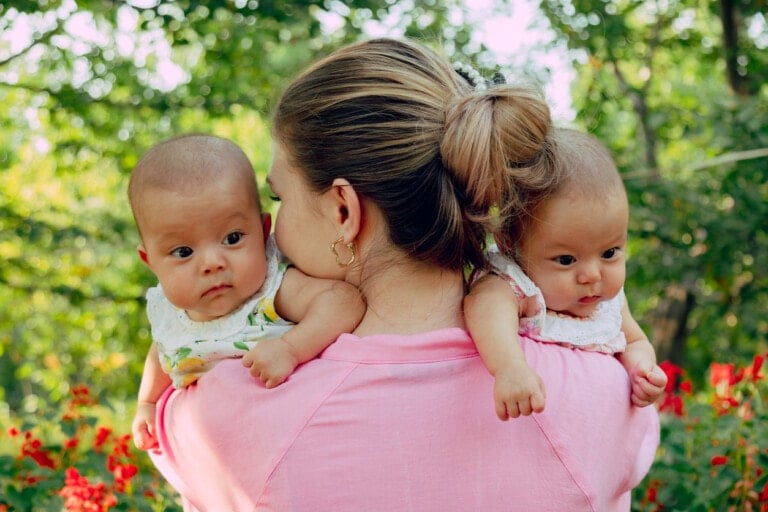Twins, Tantrums, the Terrible Twos, and Threenagers!
Having two and three-year-olds is about the nearest flash-forward you’ll get to those teen years! But having twin 2 and 3-year-olds, well, that just calls for a membership to the Wine Club! Most of us want to have a tantrum ourselves in the wake of our child’s breakdown, but we try our best to keep our cool and navigate through these really trying times with our little ones. Here are a few tips to use when your twins have a meltdown the next time:
1. Walk Away
Most of us want to reason with our kids in the midst of a tantrum, but we will all learn that this is a futile attempt because a child in the middle of a tantrum will not listen or understand what you are saying, let alone reason and communicate with you as to what is wrong with them. The best thing to do at this point is to let them know you will walk away to give them a little time off. Not paying attention to the tantrum, most times, will give that child a bit of space to calm down and understand that with that behavior, they will not get the attention they are looking for. By giving attention, you are fueling the tantrum and perhaps having them scream and cry a bit louder.
Walking away will not only give the child time to calm down but time for you to regroup before your nerves escalate even more. In most instances, the other twin has caused said tantrums, so remove the other twin away from twin doing floor angels to avoid getting them more upset.
2. Get Down on Their Level
Many times when they are having a tantrum, we are having our own tantrum. We are towering over them and looking downward and trying to reason from 4 feet above them. Getting down to their level and sitting on the floor with them as they are calming down will have better results than you standing or trying to pick them up. Sitting or kneeling at their face level will give them the message that you are coming down to their view of the world and that you are trying to see things from their point of view.
Once you can talk to them, bring in the other twin if they aided in the tantrum. Speak to both about how we can solve the problem for future play. Also, acknowledge their feelings of being upset and frustrated and give them examples of how they can verbalize to coexist with the same toys and games. Not only telling them to use their words but giving examples of what words might work for them in future situations.
3. Mom’s Bag of Tricks
Of course, it is easier for this to be possible if you are home, but like most of us, these wonderful serenades happen in public more times than not. And when these happen, don’t you just want to be swallowed whole by the earth? But instead, we smile, speak through our teeth, and sweat profusely as we try to offer any kind of diversion from every parent’s worse nightmare in the middle of the grocery store.
As onlookers are giving you stares, you reach into your purse for anything to distract your child and try to remain calm. Having a little toy car, a little book, or any other toy or trinket that they haven’t seen in a while will perhaps calm the storm for a bit. If all else fails, pull out your phone with Kids Youtube! Also, having them help grab something from the shelf can cause a distraction. More times than not, at a grocery store or a restaurant, the tantrum is happening because they are hungry, tired, or just plain bored. Doing these errands after they have slept and eaten will go a lot more smoothly.
4. Stay Cool & Collected
Although this is incredibly hard at the time, talking in your most calm and soothing voice is key. If they feel your tension and frustration, things will only escalate. The whole reason that they are having a tantrum in the first place is to get attention. They don’t care if it’s positive or negative attention because they just want YOUR FULL attention. Talking calmly lets your child understand that their behavior will not negatively get to you. Although you are staying calm for them, you are also doing it as much for yourself to avoid your blood pressure tipping the charts! Acknowledge their feelings of being upset and frustrated and give them examples of how they can verbalize their feelings.
5. Cuddles Go a Long Way
I have proven this works in the last couple of tantrums we have had. Instead of escalating with my children, recently, I have just told them I am going to hug you now, or if I sense their mood. I will just hug without saying anything and instantly, they will stop and hug right back. I’ll usually rub their back and sit on the couch or floor and not saying anything. I will rock and rub them for a good 5 minutes. This has worked wonders here at home because a tantrum is usually flared by the other sibling, lack of attention, or not getting something quick enough.
6. Change of Scenery
The cuddling is usually a bit harder in public as you may have other kids, strollers, shopping carts, groceries, etc. In this instance, it is best to drop everything and just go to the car and regroup. Sometimes the atmosphere is a bit too much stimulation for a 2 and 3-year-old. Noise, loud sounds, too much stimulation, and too many people may trigger a tantrum.
Changing the atmosphere usually helps. In a grocery store, leave the groceries and go back to the car to take a minute or two for things to subside. At a restaurant, just take a walk outside for a bit and once they are calm, talk things over before coming back in. At a friend’s house, go outside and change the scenery for a moment. Sometimes they just need a time out from that situation.
Finally, laugh it off! As much as the situation is one of the most mortifying moments a parent can go through, smiling and acting like it’s not a big deal in public is what others will notice, not how bad your child is! At the end of the day, a child is a child and it is part of their growth to have tantrums, but how you manage it will say the most about you, at least to all those parents and onlookers with perfect parenting skills and perfect children!



























